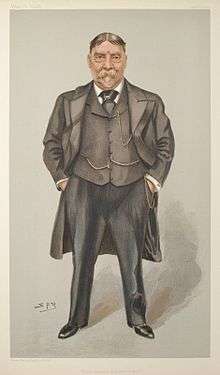Archibald Lucius Douglas
| Admiral Sir Archibald Douglas GCB GCVO | |
|---|---|
 "North America and West Indies" Douglas as caricatured by Spy (Leslie Ward) in Vanity Fair, July 1902 | |
| Born |
8 February 1842 Quebec City, Quebec, Canada |
| Died |
12 March 1913 (aged 71) Newnham, Hampshire, England |
| Allegiance |
|
| Service/branch |
|
| Years of service | 1856 – 1907 |
| Rank | Admiral |
| Awards |
Knight Grand Cross of the Order of the Bath Knight Grand Cross of the Royal Victorian Order |
Admiral Sir Archibald Lucius Douglas, GCB, GCVO (8 February 1842 – 12 March 1913) was a Royal Navy officer of the 19th century.
Naval career
Douglas was born in Quebec City in pre-Confederation Canada in 1842. Educated at the Quebec High School, he joined the Royal Navy as a cadet in 1856.[1]
He was selected to head the second British naval mission to Japan in 1873, and served as a foreign advisor to the fledgling Imperial Japanese Navy until 1875.[2]
Douglas was based at the Imperial Japanese Navy Academy, then located at Tsukiji in Tokyo, where he trained a class of 30 officers. During his tenure, his advice was called upon for the Taiwan Expedition of 1874, the first major overseas deployment for the Japanese navy.
During his stay in Japan, he is also credited with having introduced the sport of football to Japanese naval cadets.[3]
During the Russo-Turkish War of 1877-1878, Douglas commanded HMS Egeria on an intelligence gathering mission to Petropavlovsk in Kamchatka, which he found to have been abandoned by its Russian garrison.[4]
Douglas was appointed Commander-in-Chief, East Indies Station in 1898[5] and Second Naval Lord in 1899. He was promoted to the rank of vice admiral on 15 June 1901,[6] In June 1902 he was appointed Commander-in-chief of the North America and West Indies Station,[7][1] and he arrived in Halifax to take up the position on 15 July with his flagship, the cruiser HMS Ariadne.[8] He went on to be Commander-in-Chief, Portsmouth in 1904[9] and retired from the service in 1907.[1]
In 1910 he was made an honorary LL.D. of McGill University; in 1902 he was created a KCB, in 1905 a GCVO, and in 1911 a GCB.[1]
Douglas died in Hampshire, England in 1913.
Family
Douglas married, in 1871, Constance Ellen Hanks, daughter of Rev. William Hanks. Mrs. Douglas (as she was known then) was godmother to HMS Lancaster in March 1902.[10]
References
- 1 2 3 4 W. Stewart WALLACE, ed., The Encyclopedia of Canada, Vol. II, Toronto, University Associates of Canada, 1948, 411p., p. 229
- ↑ Ian Gow, 'The Douglas Mission (1873-79) and Meiji Naval Education' in J.E. Hoare ed., Britain & Japan: Biographical Portraits Volume III, Japan Library 1999 ISBN 978-1-873410-89-9
- ↑ Embassy of Japan in the UK
- ↑ Cambridge Journals
- ↑ William Loney RN
- ↑ The London Gazette: no. 27325. p. 4183. 21 June 1901.
- ↑ "Naval & Military intelligence". The Times (36763). London. 9 May 1902. p. 10.
- ↑ "Naval & Military intelligence". The Times (36822). London. 17 July 1902. p. 9.
- ↑ England's Share in Togo's Victory Ashburton Guardian, 1905
- ↑ "Launch of the Lancaster". The Times (36723). London. 24 March 1902. p. 10.
- Douglas, Archibald C. Life of Admiral Sir Archibald Lucius Douglas, G.C.B, G.C.V.O, Commander of the Legion of Honour, Order of the Rising Sun of Japan, Spanish Naval Order of Merit, by his son. Mortimer Bros (1938) ASIN B001CO3IT8
| Military offices | ||
|---|---|---|
| Preceded by Edmund Drummond |
Commander-in-Chief, East Indies Station 1898–1899 |
Succeeded by Sir Day Bosanquet |
| Preceded by Lord Walter Kerr |
Second Naval Lord 1899–1902 |
Succeeded by Sir John Fisher |
| Preceded by Sir Frederick Bedford |
Commander-in-Chief, North America and West Indies Station 1902–1904 |
Succeeded by Sir Day Bosanquet |
| Preceded by Sir John Fisher |
Commander-in-Chief, Portsmouth 1905–1907 |
Succeeded by Sir Day Bosanquet |
| FOREIGN MILITARY MISSIONS TO JAPAN | ||||||||||||
| FRANCE |
||||||||||||
| French military mission to Japan (1867–68) French military mission to Japan (1872–80) French military mission to Japan (1884–89) French military mission to Japan (1918–19) |
Tracey Mission (1867–68) Douglas Mission (1873–75) Sempill Mission (1922–23) |
Meckel Mission (1885–90) |
Pels Rijcken (1855–57) Kattendijke (1857–59) Schermbeck (1883–86) |
Pompeo Grillo (1884–88) Quaratezi (1889–90) | ||||||||